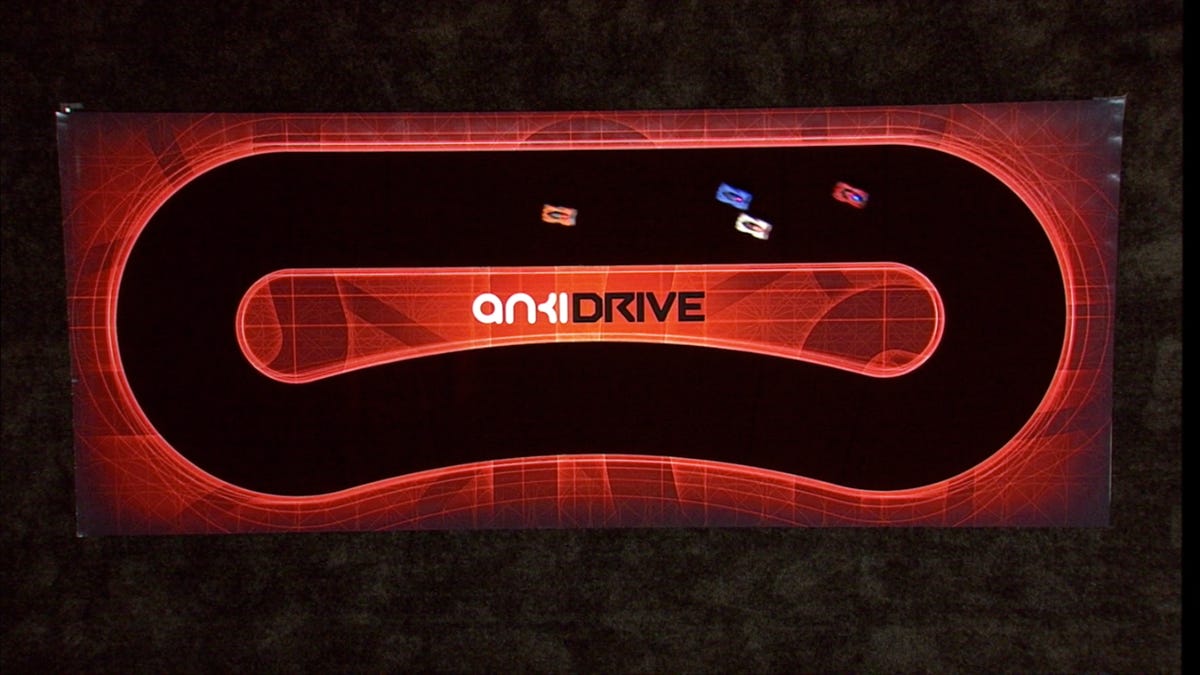Anki, blessed by Apple, takes AI and robotics to consumers
Apple gave the startup a coveted slot during the WWDC keynote event, and Anki used it to showcase what might be the most impressive demo of artificial intelligence and robotics ever.

When Apple turns over part of its oh-so-important Worldwide Developers Conference keynote address to an unknown startup, you can be sure Tim Cook and Co. think they're dealing with some very cool technology.
That was very much the case with Anki, which was handpicked for a coveted slot as the poster child for what unknown developers can do with iOS. During its time onstage, Anki showed off what at first appears to be a simple toy car racing game, but what in reality might be the most advanced intersection of consumer-grade artificial intelligence and robotics ever.
In an interview in San Francisco a few hours after the keynote address, Anki co-founder and CEO Boris Sofman told CNET that Anki -- the company's name comes from the Japanese word for learning by heart -- is in the business of bringing AI and robotics, a combination that has long been the exclusive province of the defense industry, to consumers.
Apple clearly loved what Anki is doing with iOS: Users who buy the approximately $200 product starting this fall will use their iPhones or iPod Touches to control a little physical race car stuffed full of things like optical sensors, wireless chips, motors, and microcontrollers. Sofman said that he thinks of the technology much like a video game come to life, with the cars taking on the characteristics of video game characters, except in the physical world.
At the core of AnkiDrive -- which came out of the founders' desire to bring to the consumer level what they learned working on $600,000 autonomous vehicles at Carnegie-Mellon -- is a system built to process real-time positioning, reason, and execution by "analyzing hundreds or even thousands of actions across four dimensions," Sofman said.
In the racing game, that means that players can control a car, and race it against another, and each vehicle roars around a track taking into consideration thousands of scenarios, all while pursuing a specific mission. Anki isn't saying yet what the missions will be -- beyond winning a race -- but during its onstage demo at the WWDC keynote event, Sofman showed off a situation where three people controlled individual cars, while a fourth, autonomous, and faster and smarter, weaved through and around them.
"It behaved how you would expect an intelligent driver" would drive, Sofman recalled, "but then we told the three to block the fourth." And that's when the fun began.
As the thousands in the room for the keynote address, and hundreds of thousands who watched it online experienced it, the fourth car zigged and zagged its way through the other three, and then used a "weapon" to "shoot" the others, which, when hit, would fly off the track, just as they would if they'd been hit by a real projectile. None of this was pre-programmed.
Sofman said that Anki's toy cars race at the equivalent (if they were full-size cars) of 250 miles an hour, and move with a precision of a 10th of an inch. That's possible, he said, because of components built in that check their driving logic 500 times a second, and convey positioning information to the wheels every two milliseconds.
For now, Anki isn't showing anything but its racing game, and won't say how many cars users will get for their $200. But Sofman made it clear that what Anki is showing today is merely the beginning of a new consumer AI/robotics industry, something that was never possible before due to the prohibitive price of the necessary components.
But because Anki's hardware incorporates nothing but inexpensive commodity parts, consumers will finally be able to get their hands on this kind of technology, Sofman said. What Anki is bringing to the table is the software, five years in the making, that controls it.
Thanks to its relationship with Apple and lead A-round investor (and board member) Mark Andreessen -- Anki has $50 million in the bank with which to develop AnkiDrive and whatever its next products are. And with Apple's blessing, it will sell its cars in Apple stores around the world and online, as well as on its own Web site.
Are big things ahead for Anki? Andreessen thinks so. On his blog, the Andreessen Horowitz partner said that the company is "the best robotics startup I have ever seen."

